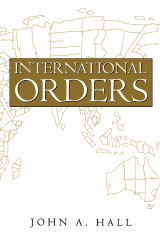Details

International Orders
1. Aufl.
|
18,99 € |
|
| Verlag: | Wiley |
| Format: | EPUB |
| Veröffentl.: | 28.05.2013 |
| ISBN/EAN: | 9780745666846 |
| Sprache: | englisch |
| Anzahl Seiten: | 224 |
DRM-geschütztes eBook, Sie benötigen z.B. Adobe Digital Editions und eine Adobe ID zum Lesen.
Beschreibungen
This book examines the different ways in which order has been achieved in world affairs with a view to understanding current political dilemmas and opportunities. <p><i>International Orders</i>begins by distinguishing between world order and international order in the spirit of Hedley Bull. This leads to an analysis of five different principles of international order - the principles of the balance of power, the concert of great powers, liberal regimes, interdependence, and the exercise of hegemony. However, principles of international order are rarely simply clear cut in their operations, they intermingle with the perceptions of human agents and the plans of political leaders who have sought to structure the world polity to serve particular aims.</p> <p>The core of this volume comprises a detailed historical sociology of how international order was achieved at three crucial phases in the history of the states system. Theories and evidence are deployed to examine: the emergence of the European states system; the development of the European state from Westphalia to the rise of Nazism; and the emergence and impact of the Cold War. Throughout, the theories of world order are examined, tested and, in the light of evidence, improved.</p> <p>In conclusion, considerable attention is given to the forces of integration and disintegration which might strengthen or undermine world order in the future, and an argument is offered concerning the ethical grounds on which intervention in the affairs of another state might be justified.</p>
Preface. <p>1. Groundwork.</p> <p>2. The European System.</p> <p>3. The Age of Revolutions.</p> <p>4. La Paix Belliqueuse.</p> <p>5. Results of the Inquiry.</p> <p>Index.</p>
'This is a very significant, thorough and perceptive contribution to a complex subject that, although very important, so far has not received adequate attention. A forceful account of the nature of international orders is accompanied by historical analysis and relevant treatments of social theory and its shortcomings. This book will have a very great appeal to a wide range of readers. If the author's recommendations are followed, politics will certainly become more reasonable and tolerant.' <i>Anatoly Khazanov</i> <p>'This book is a fine attempt to shed light on current, inconclusive debates about the nature and direction of post-Cold War international order ... <i>International Orders</i> is highly recommended. It is engaging, erudite, well argued and hard-hitting ... this book will probably fuel, rather than assuage, debate. Its major achievement lies in demonstrating the virtue of combining the best of different disciplines and theories.' <i>International Affairs</i></p>
<b>John A. Hall</b> is a Professor of Sociology at McGill University.
This book examines the different ways in which order has been achieved in world affairs with a view to understanding current political dilemmas and opportunities. <p><i>International Orders</i>begins by distinguishing between world order and international order in the spirit of Hedley Bull. This leads to an analysis of five different principles of international order - the principles of the balance of power, the concert of great powers, liberal regimes, interdependence, and the exercise of hegemony. However, principles of international order are rarely simply clear cut in their operations, they intermingle with the perceptions of human agents and the plans of political leaders who have sought to structure the world polity to serve particular aims.</p> <p>The core of this volume comprises a detailed historical sociology of how international order was achieved at three crucial phases in the history of the states system. Theories and evidence are deployed to examine: the emergence of the European states system; the development of the European state from Westphalia to the rise of Nazism; and the emergence and impact of the Cold War. Throughout, the theories of world order are examined, tested and, in the light of evidence, improved.</p> <p>In conclusion, considerable attention is given to the forces of integration and disintegration which might strengthen or undermine world order in the future, and an argument is offered concerning the ethical grounds on which intervention in the affairs of another state might be justified.</p>

















